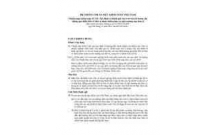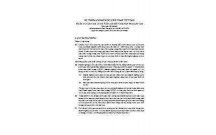
TIẾNG ANH 8 CHỦ ĐỀ ÔN TẬP KIỂM TRA Revision 3
REVISION (3)
I. OBJECTIVES:
1. Aims: At the end of the lesson, Ss will be able to revise how to use
reported speech, comparative and superlative adjectives.
2. Knowlege:
* Grammar: reported speech, comparative and superlative adjectives.
3. Skills: Speaking, Reading and Writing.
II. PREPARATION:
1. Teacher: posters, lesson plan.
2. Students: reported speech, comparative and superlative adjectives.
III. PROCEDURES:
1. Warm-up:
Rewrite the following sentences without changing their meaning:
a) My father said: “Keep silent”.
-> My father told ………………………………
b) “You should do morning exercise”, my teacher said.
-> My teacher said …………………………….
c) This book is more expensive than that book. (cheap)
-> That book……………………………………
2. New lesson:
Teacher/s activities Ss/ activities
I. Revision:
1. Reported speech:
- Use sentence a and b above and give
other examples to elicits the way to
change commands, requests and advice
into reported speech.
a) My father said: “Keep silent”.
-> My father told me to keep silent.
b) “Can you help me?”, Nga said.
-> Nga asked me to help her.
c) “You should do morning exercise”, my
teacher said.
-> My teacher said I should do morning
exercise.
- Consolidates the knowledge.
2. Comparisons:
a. Comparative adjectives
- Give out examples and calls on a student
go to the board to write the form of
comparative.
Examples:
- Retell the way to change commands,
requests and advice into reported speech.
- Listen and write down.
- Go to the board to write the form:
* Form:
+ This shirt is cheaper than that dress.
+ Mai is more beautiful than her sister.
- Elicits the way to distinguish short
adjectives to long adjectives and the way
to add –er after short adjectives.
- Consolidates the knowledge.
b. Superlative adjectives:
- Gives out examples and elicits the form
of superlative from Ss.
Examples:
+ This house is the biggest in the village.
+ This is the most expensive book in the
store.
- Consolidates the knowlegde.
- Elicits some irregular adjectives from Ss.
S1 + tobe + short adj-er + than + S2.
S1 + tobe + more + long adj + than + S2.
- Answer T’s questions:
+ Short adjectives are adjectives which
have one syllable or two syllables. If
they have two syllables, they must end in
-y,
-ow, -er, -le.
Ex: cold, happy, simple, narrow,
clever…
+ Long adjectives are adjectives which
have two or more syllables. If they have
two syllables, they mustn’t end in -y,
-ow, -er, -le.
Ex: handsome, beautiful, …
+ The way to add –er after short
adjectives:
. If short adj end in “e”, we only add
“r”.
Ex: nice -> nicer
large -> larger
. If they end in “y”, we must change into
“i” then add “er”.
Ex: easy -> easier
happy -> happier
. If they end in one vowel and one
consonant, we must double the
consonant then adding “er”.
Ex: hot -> hotter
big -> bigger
- Listen and write down.
- Go to the board to write the form.
* Form:
S + tobe + the + short adj-est.
S + tobe + the most + long adj.
- Listen and write down.
- Answer T’s questions.
* Irregular adjectivies:
- good -> better -> the best
- bad -> worse -> the worst
II. Practice:
1. Use comparative and superlative
adjectives to complete the sentences.
a. Winter is …….(cold) than summer
b. Fruit is ……(good) than candy.
c. Ho Chi Minh city is …..(big) than Hue.
d. Nam is ………(young) person in his
family.
e. What is ……..(beautiful) room in your
house?
f. I eat ……(little) fruit than my brother.
g. She works …….(few) hours than me.
- Hangs on the excercise and asks Ss to do
it.
- Gets feedback and helps Ss to correct.
2. Rewrite the following sentences, using
reported speech:
- Focuses Ss on the way to complete it.
- Invites the answers on the board and asks
the whole to check.
a) Kim said to me : “Please wait for me a
few minutes.”
b) She said: “Don’t play football on the
street, boys.”
c) “You should stay in bed and take some
medicine.”, his doctor said.
d) “Could you buy me a magazine?”, my
father said.
e) Our teacher said: “Stand up.”
- far -> farther -> the farthest
- much -> more -> the most
* Answer:
a. colder
b. better
c. bigger
d. the youngest
e. the most beautiful
f. less
g. fewer
- Work individually than compare the
answer in pairs.
- Give answer and check the answer with
teacher.
- Work individually, using reported
speech to rewrite the sentences.
- Write their answer on the board and
check the answers with teacher.
IV. HOMEWORK:
- Learn by heart the target language of the lesson.
- Continue to revise all knowledge from unit 1 and unit 8 again.
có thể bạn quan tâm

TIẾNG ANH 8 CHỦ ĐỀ ÔN TẬP KIỂM TRA Revision 1
3
553
274
Giáo án, bài giảng lớp 8
3
(New)

TIẾNG ANH 8 CHỦ ĐỀ ÔN TẬP KIỂM TRA Revision 2
3
574
250
Giáo án, bài giảng lớp 8
3
(New)

TIẾNG ANH 8 CHỦ ĐỀ ÔN TẬP KIỂM TRA Revision 4
2
1.154
297
Giáo án, bài giảng lớp 8
2
(New)

Luận văn: kiểm toán thuế trong kiểm toán báo cáo tài chính tại các DN...
87
897
376
Kinh tế quản lý
87
(New)

Chuẩn mực kiểm toán số 265: Trao đổi về những khiếm khuyết trong kiểm...
11
1.253
351
Kế toán, kiểm toán
11
(New)

Chuẩn mực kiểm toán số 220: Kiểm soát chất lượng hoạt động kiểm toán b...
17
1.424
481
Kế toán, kiểm toán
17
(New)

Luận văn: Cty TNHH Kiểm Toán Mỹ- Khái quát quy trình kiểm toán BCTC và...
161
917
340
Thạc sĩ cao học
161
(New)

Nghiên cứu trình tự chuẩn bị kiểm toán trong kiểm toán báo cáo tài chí...
65
842
356
Kinh tế quản lý
65
(New)
thông tin tài liệu
TIẾNG ANH 8 CHỦ ĐỀ ÔN TẬP KIỂM TRA Revision 3
Form:
S1 + tobe + short adj-er + than + S2.
S1 + tobe + more + long adj + than + S2.
- Answer T’s questions:
+ Short adjectives are adjectives which have one syllable or two syllables. If they have two syllables, they must end in -y,
-ow, -er, -le.
Ex: cold, happy, simple, narrow, clever…
+ Long adjectives are adjectives which have two or more syllables. If they have two syllables, they mustn’t end in -y,
-ow, -er, -le.
Ex: handsome, beautiful, …
+ The way to add –er after short adjectives:
. If short adj end in “e”, we only add “r”.
Ex: nice -> nicer
large -> larger
. If they end in “y”, we must change into “i” then add “er”.
Ex: easy -> easier
happy -> happier
. If they end in one vowel and one
Mở rộng để xem thêm
từ khóa liên quan
tài liệu mới trong mục này
tài liệu hot trong mục này
tài liệu giúp tôi
Nếu bạn không tìm thấy tài liệu mình cần có thể gửi yêu cầu ở đây để chúng tôi tìm giúp bạn!
xem nhiều trong tuần
70 câu hỏi trắc nghiệm luyện thi chứng chỉ tin A
Đề thi và lời giải môn xác suất thống kê của trường Học viện ngân hàng
Địa lý 12 Phát triển cây công nghiệp lâu năm Tây Nguyên
Giáo trình Quản trị học của Đại học kinh tế quốc dân
Tiểu luận: Vị trí, vai trò, nhiệm vụ của người Đảng viên với ĐCSVN- Phấn đấu, rèn luyện và tuyên truyền nhân dân của người Đảng viên
Bài tập nâng cao Tiếng Việt lớp 2: Chính tả
yêu cầu tài liệu
Giúp bạn tìm tài liệu chưa có
×



